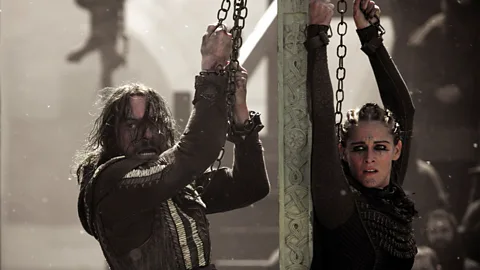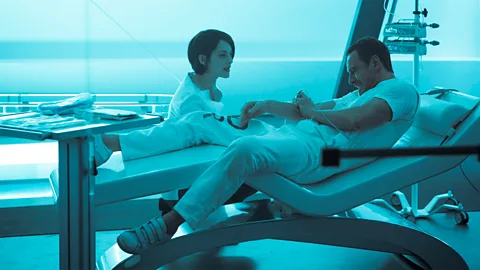Assassin’s Creed is ‘a treat for fans of terrible films’

Video game adaptations for the big screen tend to be bad – but Assassin’s Creed stands apart from them all in its dreadfulness and pretension, writes Nicholas Barber.
There’s a treat in store for anyone who takes a perverse pleasure in seeing truly terrible films, because Hollywood’s latest video-game adaptation, Assassin’s Creed, is a Christmas turkey with all the trimmings. That may not seem too surprising, given that most films based on video games are awful, but this one isn’t a shoddy cash-in, as so many of them are. Earnest, unorthodox, and clearly expensive, Assassin’s Creed has the special dreadfulness of a project conceived as a towering artistic masterpiece.
Its director is the acclaimed Justin Kurzel, whose feverish Macbeth was in competition at Cannes in 2015. Its two A-list stars are Michael Fassbender and Marion Cotillard, who were in Macbeth together. And it is plain that they are all taking the ludicrous material very, very seriously. Fassbender and Cotillard are both as scowly and intense as they were in Shakespeare’s tragedy, and Kurzel has fashioned all sorts of moodily lit, inventively psychedelic sci-fi weirdness. And yet, despite their considerable efforts, everyone involved must have realised, by the end of production, that Assassin’s Creed had fallen several miles short of the film they had in mind. Imagine, instead, a remake of The Matrix directed by Terry Gilliam, but scripted by a five-year-old boy and edited by a chimpanzee.
Kurzel’s folly gets off to an ominously indecisive start by having three separate beginnings. The first of these is set in Spain in 1492 (guess which Italian navigator pops up), where Fassbender’s character, Aguilar, is being inducted into a secret society of hooded assassins called, imaginatively, the Assassins. A central part of the induction ritual is to have one of your fingers lopped off so that it won’t get in the way of a spring-loaded knife strapped to your wrist. It’s the kind of idiotic concept that would be forgivable in a video game, or in a knowingly trashy action movie, but which is embarrassing in something as portentous as Assassin’s Creed.
The story begins – again – in 1986 by showing a boy named Cal Lynch practising BMX stunts, the film’s one and only attempt to humanise its main character. It then begins a third time in 2016 with Cal, now played by Fassbender, in a Texan prison, about to be executed for murder. But don’t be put off. Cal grunts that his victim was a “pimp”, so it’s supposedly acceptable to view Cal as a hero.
 20th Century Fox
20th Century FoxThe lethal injection doesn’t work, unfortunately, and Cal wakes up in a Bond villain’s lair, ie, a cavernous paramilitary compound with concrete walls at funny angles, and an absurd number of security guards wandering around in smart uniforms. Unlike most Bond villain’s lairs, though, this one isn’t hidden in a volcano, but perched on a mountain overlooking Madrid. What do the locals think of it, I wonder? Have they heard that it houses “a private organisation dedicated to the perfection of humankind”? Or are they just glad that it provides so many employment opportunities for aspiring security guards?
The organisation’s top scientist, Sofia Rikkin (Cotillard), is the person who rescued Cal from death row, but don’t ask me how she did it. She saved him, she explains, so that he can locate The Apple of Eden, which isn’t really an apple, but an ancient metal orb containing “the genetic code for free will”. If that sounds ridiculous, listen to this: the Apple has been missing since 1492, which means that the characters in the 21st Century must believe that the characters in the 15th Century knew all about DNA. How do you like them apples?
Next level
Sofia then explains that Cal is descended from the Assassin we met at the start of the film. Despite being distant relatives, their genetic make-up is apparently so similar that once Cal is strapped into Sofia’s virtual-reality past-life-regression machine, the Animus, he will be able to experience everything his ancestor did, and that will somehow lead Sofia and her colleagues to the Apple. The upshot of this convoluted premise is that the film gets to be stupid, tedious and incoherent in two different time periods. In the present-day segments, Cal hangs around the compound, listening to the gobbledigook intoned by Sofia and her dad (Jeremy Irons, topping up his pension fund). In the Robin Hood-like segments set in the past, Aguilar battles the Knights Templar, using lots of martial arts and parkour techniques which you wouldn’t normally associate with Renaissance Spain.
These acrobatics might have been fun to watch if they weren’t obscured by clouds of smoke and shredded by the frantic editing, but I have my doubts. The problem is that we aren’t offered any grounds whatsoever to care what happens. We learn almost nothing about Cal and Aguilar, or about Sofia’s organisation, or about her father, or about the other people in the compound, or about what the Apple actually does, or about the Assassins, or about why they’re all so relaxed about having their fingers chopped off.
Even when an intriguing idea does crop up, the film doesn’t make anything of it. For instance, the Christian reconquistadores are portrayed as fanatical villains while the Muslim Moors are the good guys, which is certainly unconventional for a Hollywood blockbuster. There’s also a speech about the Assassins being the defenders of “protest and dissent”, a notion which might, in theory, have had some contemporary relevance. But don’t expect Assassin’s Creed to say anything boldly political. As po-faced as it is, it devotes more dialogue to the food served in the compound’s canteen than it does to the state of the world.
Presumably Kurzel was hoping to explore some more of the game’s themes in a sequel, because the film he’s made doesn’t even have a proper ending. Just when it seems as if the plot might at last be getting underway, it cops out with an abrupt anti-climax, and a final shot which could have been captioned: “To Be Continued!” The chances of a sequel happening, however, are very slim indeed.
★☆☆☆☆
If you would like to comment on this story or anything else you have seen on BBC Culture, head over to our Facebook page or message us on Twitter.
And if you liked this story, sign up for the weekly bbc.com features newsletter, called “If You Only Read 6 Things This Week”. A handpicked selection of stories from BBC Future, Earth, Culture, Capital, Travel and Autos, delivered to your inbox every Friday.
